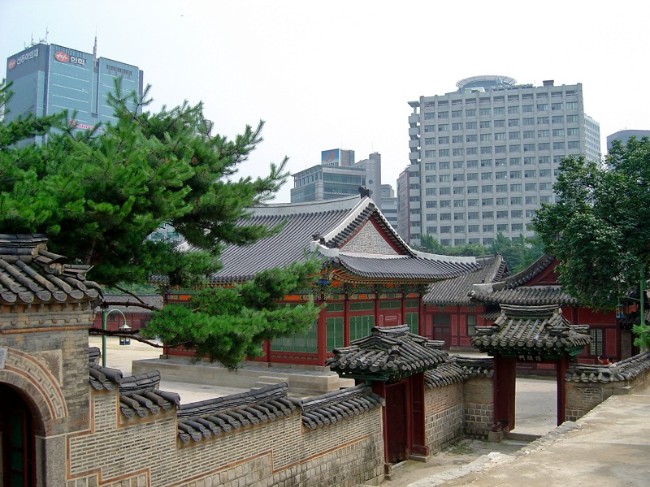
MOST POPULAR STORIESˇ
Republic of Ireland football team to play Spain in New York friendly this summer
Posted 12 hours ago
Opinion: Is it safe in South Korea? An Irishman's reflection on living in the country


Image: Wikimedia Commons
Conor O'Reilly is a teacher, blogger and journalist from Co Meath who's now living in South Korea.
Here, he reflects on increasing tensions between North and South Korea and what, if any, impact they have had on day-to-day life.
Today a pair of jets flew over me. They were fast but more significantly they were loud enough to cancel out the noise from the rest of the street. When I first arrived in Suwon in South Korea three years ago this was amazing, now it is less so.
In the university where I teach on the outskirts of the city these passing fighters regularly interrupt a class to the point where I have to stop talking as there was little point in trying to talk over them. Imagine a large truck passing you in the street as it honks its horn. You may consider this a similar interruption, and you may in certain respects compare this to the current situation being pushed by North Korea, at least that is the general belief here.
The thing is, South Korea has been at war with North Korea continuously since 1950 (a peace treaty was never signed), and this includes all seven of the years I have made my home in Korea. In Seoul, where I lived for three years, you would rarely see any evidence of the military, with the exception of the occasional young male in fatigues with a shopping bag in hand as he enjoys a few days leave from his military service. It was only in my wife's hometown Jumunjin on the east coast where you would see proof, with lines of barbed wire fencing and occasional guard posts lining the coast.

Image: Deoksugung (Deoksu Palace) in Seoul, Korea. Wikimedia Commons
In 2010 I moved with my wife to Suwon, about forty minutes south of Seoul. If it weren't for the fact that our home and my workplace lie in the flight paths of Suwon Air Base, a major South Korean Air Force base, and Osan Air Base, which is the US military's air base in Korea, I can imagine that Suwon would be as quiet as Seoul.
You could spend a long time here and never witness any sign that this is an intensely militarised peninsula. That's not to say that it's hidden, it's just that the belligerent northerly neighbour is not taken to be the most important issue on South Koreans' agenda, and many have really just decided to get on with their lives. They see little threat, and many expatriates who have made Korea their home, including myself, share this opinion.
The other day I asked my Irish friends on Facebook how they were thinking about the current situation, and most of us agreed that while there was definitely good reason to read the news more, none of us were dashing off to the nearest supermarket to stock up on tinned food and UHT milk. A friend of mine from Bray said that he had made an arrangement with his partner to meet up in one particular place in the south of the country if the worst came to the worst. Doing any more than this would be a completely unnecessary reaction to what is, for want of a better description, a normal situation.
As someone who has witnessed their fair share of posturing, including the sinking of the Korean ship Cheonan in 2010 and the shelling of Yeongpyeong Island in 2011, these recent infringements are little more than words. When North Korea wants to attack, it attacks, and when Kim Jung Un proclaims to put Seoul under a sea of fire, he seems to be using the same script from the last time his father threatened.

Image: Wikimedia Commons
Meanwhile, things continue as normal. The streets around my home today were as busy as usual on a glorious April afternoon. Myself, my wife, and daughter spent the afternoon out around town. The Starbucks I sat in writing the beginning of this piece was bustling with students and mothers with their children as usual. The subway we took was busy enough to struggle to find a seat, and K pop blared from mobile phone shops as perpetually as usual. People were not glued to the television waiting for the latest update as you might imagine.
There is a chance that we could feel so secure that we are avoiding the possible outcome of a serious conflict. Yet, when you actually weigh the possibilities it's clear that, firstly there is no chance of nuclear bombs going off in Korea, but there may be a possibility of a skirmish of some description. Some people worry that this may escalate to something greater, but a full scale war is not going to happen, and Koreans know this. How do they know this? Well, if there was a full scale war the North Korean state would simply starve itself into defeat within a couple of weeks.
From the perspective of those of us in Korea, the more we hear the reaction of the press and watch news broadcasts, what is most disconcerting is the range of potential outcomes being reported on. It really is terrifying to see that often in Ireland for example they appear to be broadcasting a worst case scenario, which is far from the reality. There seems to be little explanation as to the reasons for many of the actions, and little interpretation of all the facts, so much so that people in Korea are being called upon repeatedly to assure people that while it is tense, there is little to no chance of nuclear war.
In 2009 when North Korea tested a nuclear weapon there was a similar exchange and the South Koreans and United States balked on resisting. This time they are acting less naïve. There is enough information out there to give even the least attentive armchair analyst a decent perspective.
For starters, North Korea only has a bomb and not a warhead, and the ICBMs being touted have actually never been tested, which is what some analysts are expecting to happen with the recent move of missile technology to the east coast, where most weapons testing takes place. What has also not been mentioned much I believe is that North Korea's reactions are actually directed at the annual South Korean and US war games on the peninsula, which usually results in some class of complaint. It is a tense war of words but experts and officials are confident that they have the situation under control, and no embassy has yet to advise its citizens to take particular caution in Korea.
We take comfort that the government of Korea have no intention of dragging their country into a war which would decimate their people once again. The Korean people have worked incredibly hard to achieve their current position and no politician is willing to risk that success by over-reacting to another North Korean filibustering attempt to win aid concessions back after being scolded by the UN. South Korea has been dealing with this for many years, and they know how to manage their cranky and isolated neighbour.
For many normal Koreans, North Korea is nothing but a constant irritation and embarrassment which over shadows the success story of South Korea. This is the only country in the world which has gone from being a receiver of international aid to a giver of international aid, and I should add that one of the biggest recipients of this aid is in fact North Korea. Koreans and those who live in Korea have more important things to be worrying about than the posturing of Kim Jung Un.
Conor O'Reilly is teacher, journalist, and blogger from Co Meath. He first arrived in South Korea in 2005, and currently resides in Suwon with his wife and four month old daughter. Blog: ifihadaminutetospare.wordpress.com


Comments
show moreNo comments yet. Be the first to leave a comment below...